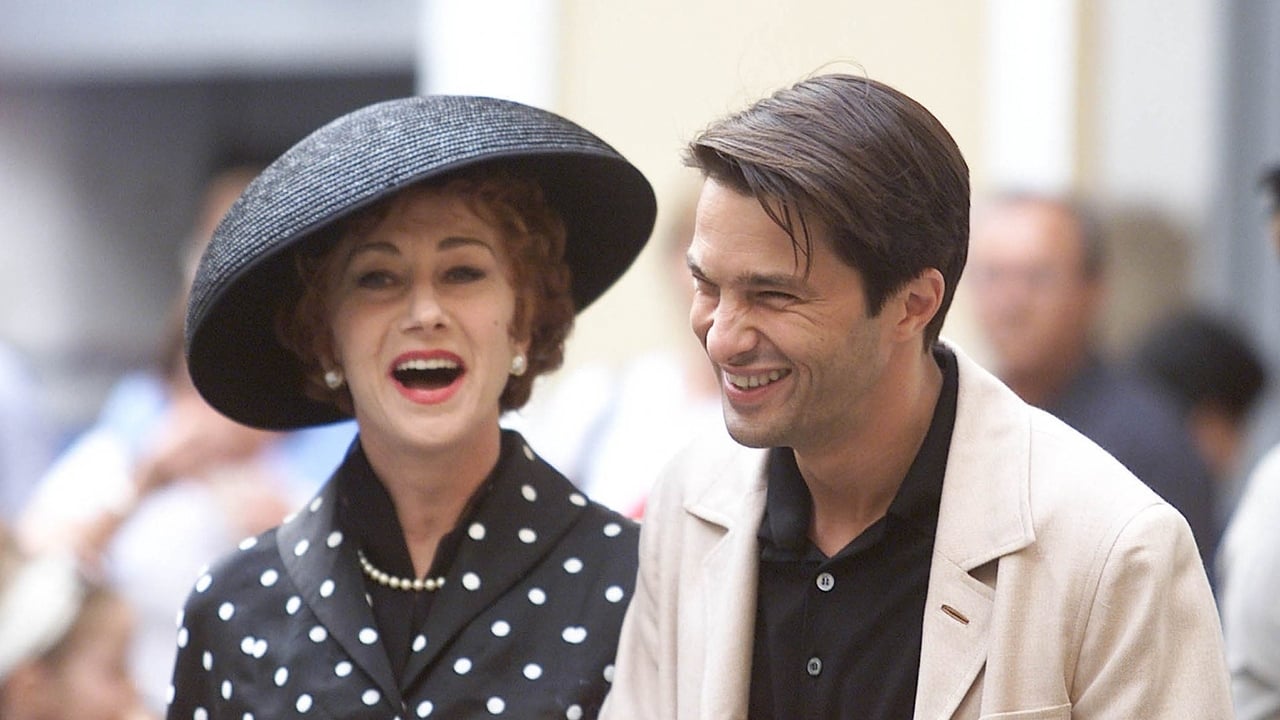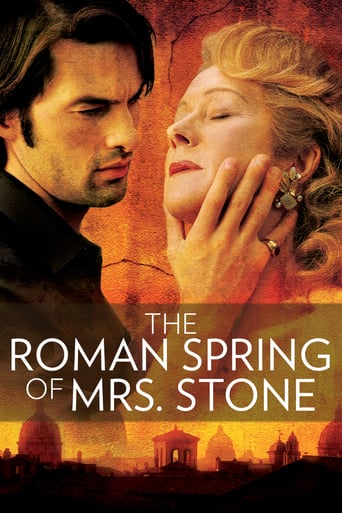David Callahan
I confess that this second filmed version is my only real familiarity with the story. I had heard that the end was supposed to represent a de facto suicide. It may actually help not to have too many antecedents in this case because the ending here seems to be suggesting (or at least allowing for) a resolution that is quite different from suicide. It is Paolo who introduces the foreshadow of death into the story by telling Karen a morbid cautionary tale about an unfortunate woman of similar circumstance in order to put Karen back in her place. I don't know that it has more of the inevitability of truth about it than any of the rest of his braggadocio. Paolo is abusive because he resents his economic need to prostitute himself. Karen is vulnerable to Paolo's cruelty because she is not facing facts, i.e., facts about her age, her talent, and her need for love. She speaks of their shared "loss of dignity," but it is actually illusion that she is shedding, especially the illusion that Paolo is anything more than a prostitute with aristocratic pretensions. The film helps us to see this by continually implying comparisons between Paolo and the unwashed but rather attractive young stalker who endeavors to capture Karen's attention. It seems to me that what is more inevitable than Karen's embrace of this man as a form of suicide is that she should be struck by the similarity between his importuning and Paolo's game. I can imagine as well that she should come to prefer the more straightforward, less pretentious arrangement that the final scene suggests. Would it truly be less dignified than what she has just been through?There is still ambiguity, of course. If in her need for love Karen decides to take beautiful boys twice a day "for medicinal purposes" until the love virus subsides (as her Tennessee Williams-like friend advises in the beginning) she may indeed be risking a violent end, but it also may cure her. She has already known the adoring love of her late husband. She may not need to replicate it after all. In dispensing with pretense, she would be in a better position to know and come to terms with her realities. At the end of the film, the way forward for Karen may well be a more honest accommodation of mutual need beginning with this stranger. It is certainly a delicious irony of Williams' writing that whichever Karen has in mind, either way she will set herself free.
Alec Kitroeff
I haven't seen the 1961 version nor have I read the Tennessee Williams novella but I found nothing redeeming in this picture except for poor Brian Dennehy who withdraws gracefully in the early part with a fatal heart attack and is spared further contact with his sex-starved wife (Mirren), the scheming contessa (Bancroft) and the repulsive gigolo (whatever his name is). Helen Mirren is undoubtedly a first class actress and she plays the sordid role assigned to her with near perfection But that doesn't absolve the makers of this film from their responsibility in producing a thoroughly nasty picture peopled by unspeakably nasty characters. The scene where the gigolo urinates in full view of Mirren was utterly revolting.
standman-1
There's much about this production that is very good. I think Martinez is much better than Warren Beatty, who was dreadfully miscast. Some things are better realized in the recent version, such as the young man who waits in the shadows. The camera work is outstanding and I think Mirren's wardrobe is better than in the earlier film.But I think there's a fatal flaw in the casting of Helen Mirren as Karen Stone, for the reason which I think made Vivien Leigh more suitable to the role. This goes to the heart of a major theme in Tennessee Williams: evil people bent on destroying those who are fragile and vulnerable.For all her greatness as an actress, there's nothing vulnerable about Helen Mirren. She's too strong and formidable a person to play a fragile flower. I always feel a sense of "Don't tread on me" when watching her.
andros12
I found myself reminiscing about this film long after having seen it. Initially expecting a probable pale imitation of the 1961 original; it seemed this new film appeared to possess many symbolic occurrences and images that seemed strangely familiar. For example, the homeless man knocking at Karen Stone's door reminded me of a picture I had seen as a child. The caption below the picture read "Look, I am standing at the door knocking. If one of you hears me calling..." Revelation 3:20I also remembered some of Helen Mirren's past performances as characters very unlike Mrs. Stone; therefore it required a preliminary adjustment to accept her as the more sensitive, deeply passionate, fading beauty. However, her outstanding vocal delivery and subtle nuances in voice and movement combined very effectively to bring Karen Stone to life. Karen Stone, a woman bewildered and lost after her humiliating final theatrical performance, the death of her husband and the loss of her youth finds herself "drifting" with no particular focus after finally deciding to settle in Rome. She meets an "old harpy" named the Contessa and her "man for hire" Paolo Di Lio. Olivier Martinez plays Paolo in stereotypical fashion as a vain, arrogant, self-centered rogue and Karen Stone is totally captivated by him. "Love is blind" is truly one of the film's major underlying themes as Mrs. Stone refuses to accept the total reality of her arrangement with Paolo anymore than he fully accepts the fact that he is, in actual fact, a purchased lover. Even Karen's physical appearance changes as her "addiction" progresses to the point where she resembles a heavily made-up caricature of her former self.The films heavily stylized 1950's costuming, artful set decoration, masterful cinematography and haunting, poignant score set against the backdrop of the "eternal" city serve as a very effective combination of elements in creating the films memorable romantic impression.For the most part, the characters are interesting and enjoyable to watch providing one accepts them strictly for who and what they represent. Anne Bancroft as the calculating Contessa appears to have a fun loving side as opposed to Lotte Lenya's vicious ruthlessness in the original film. Coral Browne's performance as Karen Stone's friend in the original film is, however, sadly missed.Rodrigo Santoro's performance as the homeless man presents an interesting character study because of his primary reliance on facial expressions which are powerfully supported by the films unique presentations of symbolism, colour and sound. When Karen Stone first makes eye contact with him on a bridge he responds with a provocative leer and exposes his chest, his hand held over the heart area. This gesture is dramatically different from her initial meeting with Paolo, wherein he lights her cigarette, a probable symbol of a fleeting but fatal pleasure.From the beginning the homeless man appears to be on a quest to establish contact with Mrs. Stone. His motivational perspective as a positive or negative force remains unclear throughout the film. At one point, there is a wonderfully effective camera shot circling around his head as he gazes up at Mrs. Stone on her veranda. An impoverished vagrant, he goes largely unnoticed as he eats scraps off the ground, gets kicked by a police officer, is laughed at by Paolo's barbers and is repeatedly viewed with disdain by Mrs. Stone. Thus begins a series of unexpected but plausible Biblically symbolic references: "...without majesty, we saw him, no looks to attract our eyes, a thing despised and rejected..." Isaiah 53:2 The homeless man's next couple of appearances are lewd demonstrations perhaps meant to reflect Mrs. Stone's "addiction" to physical pleasure at the expense of her personal dignity. Later, Paolo calls Karen to the window and asks her the identity of the man in the street. There are cathedral bells ringing in the distance as she refers to the him using the somewhat unusual description as a probable "money changer." Luke 2:14. When the mysterious man knocks on her door for the last time, Mrs. Stone finally confronts him with her impassioned plea, "Why do you follow me?" He responds with a mute, tear filled expression.The film is brought to a overwhelmingly unhappy, emotional climax at Karen Stone's final "party" when she overhears the Contessa describing her as "a harlot who has struck it rich." Karen looks to Paolo for reassurance. There is none. Mrs. Stone is at last forced to come to terms with the person that she has become.Left alone after throwing out Paolo, the Contessa and friends, Helen Mirren performs a wonderfully effective mime performance as a woman alone and humiliated while pacing around her clock as she silently acknowledges her helplessness over the passage of time.She then wraps the three keys to her apartment in a white handkerchief. Waving the handkerchief like a flag of surrender from her veranda, she throws it down to the homeless man waiting on the street. He takes the keys and looks up, his face a rich tapestry of emotion. As he approaches the first gate to her apartment, a "trinity" of lights shine in the background. In addition, directly behind him an obelisk-like formation reflecting an ice-blue light projects toward the sky resembling a "conduit" of sorts. As he approaches the second gate it becomes apparent that the stairway leading to Mrs. Stone's apartment has become awash in the blue light as well. When he opens her door the light enters her apartment and it also flows in through the windows. The blending of the various colours form an echo reminiscent of a renaissance painting. The homeless man moves silently toward her, his face half obscured in shadows, his eyes a profound reflection of love and understanding.As Mrs. Stone smiles back, the couple's faces go out of focus, as though each person had suddenly ceased to exist.

